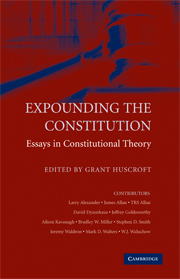Book contents
- Frontmatter
- Contents
- Preface
- Contributors
- Introduction
- PART I MORALITY AND THE ENTERPRISE OF INTERPRETATION
- PART II JUDICIAL REVIEW, LEGITIMACY, AND JUSTIFICATION
- PART III WRITTEN AND UNWRITTEN CONSTITUTIONAL PRINCIPLES
- 9 Constitutional Justice and the Concept of Law
- 10 Written Constitutions and Unwritten Constitutionalism
- 11 Unwritten Constitutional Principles
- Index
10 - Written Constitutions and Unwritten Constitutionalism
Published online by Cambridge University Press: 25 July 2009
- Frontmatter
- Contents
- Preface
- Contributors
- Introduction
- PART I MORALITY AND THE ENTERPRISE OF INTERPRETATION
- PART II JUDICIAL REVIEW, LEGITIMACY, AND JUSTIFICATION
- PART III WRITTEN AND UNWRITTEN CONSTITUTIONAL PRINCIPLES
- 9 Constitutional Justice and the Concept of Law
- 10 Written Constitutions and Unwritten Constitutionalism
- 11 Unwritten Constitutional Principles
- Index
Summary
INTRODUCTION
Defending the idea of “unwritten law” has never been easy. Jeremy Bentham thought the very expression to be a “paradoxical and unmeaning epithet.” In his view, social reform required “fixed and accurate” laws – laws that “[w]e see, we hear, we touch; in short we handle…” This empirical concept of law follows from the ideal of law as something produced by conscious acts of sovereign will. Central to this concept are, to use H.L.A. Hart's expression, “rules of change” that permit societies to escape the confines of “primitive” custom. The progressive march of legal theory, it may be said, has been away from medieval notions of law as customs practiced time out of mind or as the immutable dictates of natural law, away from the fiction that judges discover rather than make law, and towards modern notions of law as creative political acts recorded in writing.
In terms of constitutional law, this march leads to the idea of written constitutionalism, a destination that the rebelling American colonists are often said to have reached first. It was a task especially “reserved” to the American people, wrote Alexander Hamilton, to demonstrate to the world that constitutions might be established through “reflection and choice” rather than “accident and force.” In contrast to the unwritten British constitution, about which there was “nothing visible, nothing real,” the U.S. Constitution was a “certain and fixed” law “delineated by the mighty hand of the people,” the “work or will” of a populace acting in its “original, sovereign, and unlimited capacity.”
- Type
- Chapter
- Information
- Expounding the ConstitutionEssays in Constitutional Theory, pp. 245 - 276Publisher: Cambridge University PressPrint publication year: 2008
- 10
- Cited by



